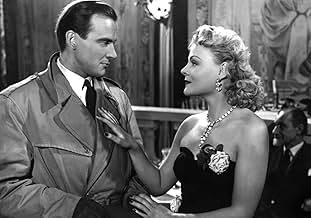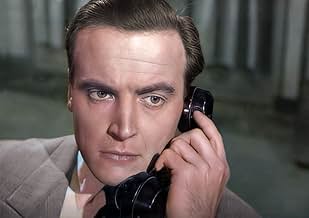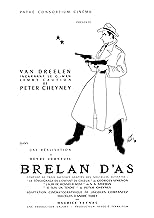Füge eine Handlung in deiner Sprache hinzuThree episodes of a police nature, one of them starring Maigret and the other Lemmy Caution.Three episodes of a police nature, one of them starring Maigret and the other Lemmy Caution.Three episodes of a police nature, one of them starring Maigret and the other Lemmy Caution.
Marguerite Garcya
- La mère de Justin (segment "Le témoignage d'un enfant de choeur")
- (as Marguerite Garcia)
Reinhard Kolldehoff
- Hartner (segment "Je suis un tendre")
- (as Koldehoff)
Christian Fourcade
- Justin (segment "Le témoignage d'un enfant de choeur")
- (as le petit Christian Fourcade)
Handlung
WUSSTEST DU SCHON:
- WissenswertesThis is the only movie where the character of Lemmy Caution isn't played by Eddie Constantine.
- Zitate
Le G'man Lemmy Caution (segment "Je suis un tendre"): She has legs that hold out their arms to you!
- VerbindungenEdited into Portrait souvenir: Georges Simenon, part 4: Maigret (1963)
Ausgewählte Rezension
The third and final segment of this omnibus film, "The Testimony of the Altar Boy" is, somewhat unusually, based on one of Georges Simenon's finest short stories instead of on one of his novels. Still featuring the dedicated commissaire Maigret in the lead, it is a wonderful story about how Maigret gently teases out the truth about a murder from the titular altar boy and how a tender friendship develops between this precocious child and child-like adult.
This film adaptation, sadly, is significantly lacking both due to Jacques Companéez's adaptation and Henri Verneuil's direction. Starting with the latter, the film begins, unlike the story, by revealing not only who the killer is but also how the murder was committed which is the central mystery of the story. Of course, none of Simenon's Maigrets is truly a detective story in the sense that the answer to the mystery is the sole point of interest but by revealing it so early, Companéez robs the story of any potential for a final twist and also of all its dramatic momentum.
There is also a misguided attempt to imbue this witty and meditative story with suspense, I suspect in order to make it fit better with the other two segments in the film based on more action-packed works. Thus, the segment ends with a chase through the streets of Paris and a shootout both of which feel utterly out of place in a Simenon story.
Verneuil's direction is disappointingly flat-footed. It is technically sound, utterly adequate and utterly boring. Comprised almost entirely of lengthy wide shots in which actors stand and deliver their lines for what seems like ages, the segment drags on even with its 30-minute runtime. Companéez must take part of the blame, of course, for his overly talky script, but Verneuil fails to give any of the scenes dramatic urgency or energy. They all proceed at the same unhurried and listless pace, without atmosphere or even humour. Simenon's perceptive characterisations are simplified to base stereotypes and the point of the story, about how all adults eventually revert to childhood, is completely lost, surviving only as a sight gag in one of the seemingly endless scenes.
There is also no attempt at making Simenon's characters come alive on screen even when the author himself gives them wonderfully eccentric and amusing characteristics. In the short story, the character of the judge is almost surreally funny, wrapped in a blanket in a sauna-like room. Adding coles to the fire surrounded by walls covered in books. His only amusement in old age is to scoff at the young altar boy as he passes by his window. In the film, he is merely an old man in a wheelchair without any of the eccentricities from the story. The wonderful atmosphere of his room and the scene in which Maigret tries to catches him out in a lie is completely lost.
None of this, I hasten to add, is the fault of the actors who are uniformly excellent. Especially wonderful are Maigret and the altar boy played, respectively, by Michel Simon and Christian Fourcade. Simon is, I'd even go as far as to say, one of the best screen Maigrets. His warm, witty, commanding presence absolutely perfect for the part of the indefatigable commissaire. I wish he'd played him more often and in better movies. Also wonderful is Claire Olivier as the overbearing Mme Maigret and the two of them develop an enjoyable and believable rapport. But the segment centres on the scene between Maigret and the boy and Simon and Fourcade are wonderful together. Effortlessly, Fourcade brings out the grown-up seriousness in the altar boy and Simon the childishness in the commissaire.
But, the wonderful cast and terrific source material are failed by a misguided adaptation and lacklustre direction. If the other two segments are as lacking as "The Testimony of the Altar Boy", I understand why "Full House" is a forgotten Henri Verneuil film.
This film adaptation, sadly, is significantly lacking both due to Jacques Companéez's adaptation and Henri Verneuil's direction. Starting with the latter, the film begins, unlike the story, by revealing not only who the killer is but also how the murder was committed which is the central mystery of the story. Of course, none of Simenon's Maigrets is truly a detective story in the sense that the answer to the mystery is the sole point of interest but by revealing it so early, Companéez robs the story of any potential for a final twist and also of all its dramatic momentum.
There is also a misguided attempt to imbue this witty and meditative story with suspense, I suspect in order to make it fit better with the other two segments in the film based on more action-packed works. Thus, the segment ends with a chase through the streets of Paris and a shootout both of which feel utterly out of place in a Simenon story.
Verneuil's direction is disappointingly flat-footed. It is technically sound, utterly adequate and utterly boring. Comprised almost entirely of lengthy wide shots in which actors stand and deliver their lines for what seems like ages, the segment drags on even with its 30-minute runtime. Companéez must take part of the blame, of course, for his overly talky script, but Verneuil fails to give any of the scenes dramatic urgency or energy. They all proceed at the same unhurried and listless pace, without atmosphere or even humour. Simenon's perceptive characterisations are simplified to base stereotypes and the point of the story, about how all adults eventually revert to childhood, is completely lost, surviving only as a sight gag in one of the seemingly endless scenes.
There is also no attempt at making Simenon's characters come alive on screen even when the author himself gives them wonderfully eccentric and amusing characteristics. In the short story, the character of the judge is almost surreally funny, wrapped in a blanket in a sauna-like room. Adding coles to the fire surrounded by walls covered in books. His only amusement in old age is to scoff at the young altar boy as he passes by his window. In the film, he is merely an old man in a wheelchair without any of the eccentricities from the story. The wonderful atmosphere of his room and the scene in which Maigret tries to catches him out in a lie is completely lost.
None of this, I hasten to add, is the fault of the actors who are uniformly excellent. Especially wonderful are Maigret and the altar boy played, respectively, by Michel Simon and Christian Fourcade. Simon is, I'd even go as far as to say, one of the best screen Maigrets. His warm, witty, commanding presence absolutely perfect for the part of the indefatigable commissaire. I wish he'd played him more often and in better movies. Also wonderful is Claire Olivier as the overbearing Mme Maigret and the two of them develop an enjoyable and believable rapport. But the segment centres on the scene between Maigret and the boy and Simon and Fourcade are wonderful together. Effortlessly, Fourcade brings out the grown-up seriousness in the altar boy and Simon the childishness in the commissaire.
But, the wonderful cast and terrific source material are failed by a misguided adaptation and lacklustre direction. If the other two segments are as lacking as "The Testimony of the Altar Boy", I understand why "Full House" is a forgotten Henri Verneuil film.
Top-Auswahl
Melde dich zum Bewerten an und greife auf die Watchlist für personalisierte Empfehlungen zu.
Details
- Erscheinungsdatum
- Herkunftsland
- Sprache
- Auch bekannt als
- Full House
- Drehorte
- Rue Julie, Paris 14, Paris, Frankreich(Street where Justin, his mother and the second-hand dealer live)
- Produktionsfirmen
- Weitere beteiligte Unternehmen bei IMDbPro anzeigen
- Laufzeit1 Stunde 58 Minuten
- Farbe
- Seitenverhältnis
- 1.37 : 1
Zu dieser Seite beitragen
Bearbeitung vorschlagen oder fehlenden Inhalt hinzufügen
















